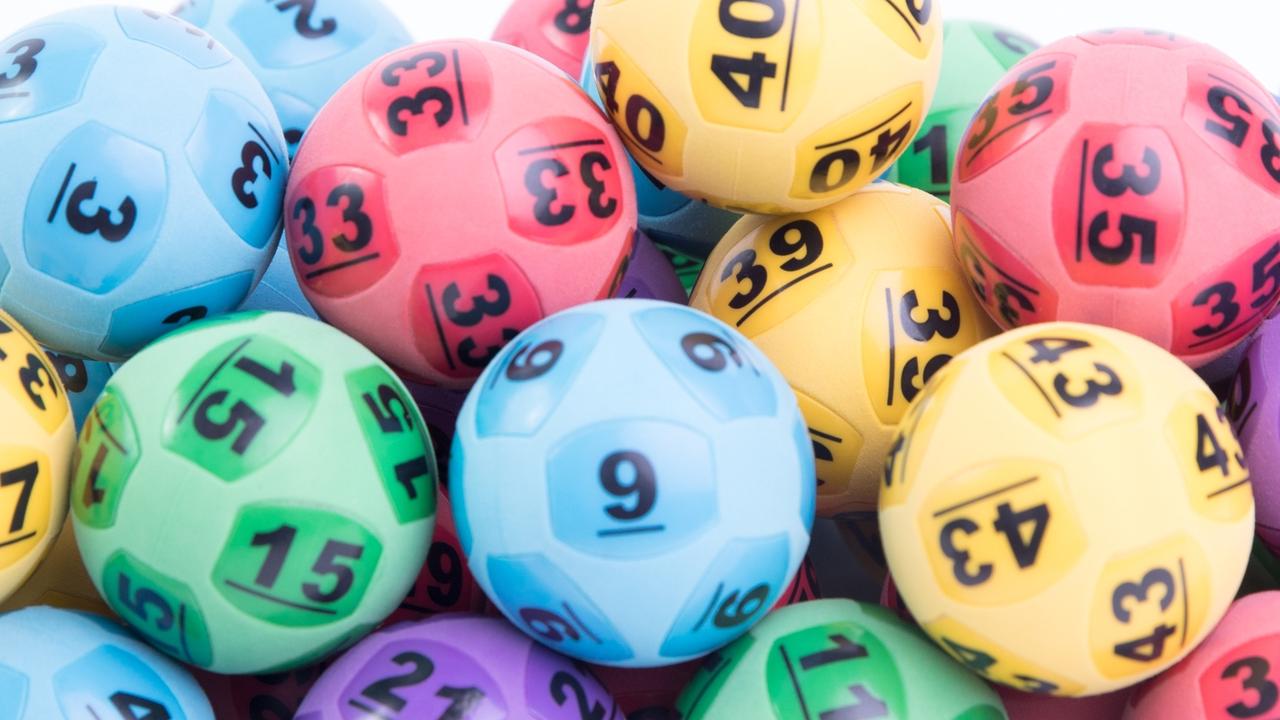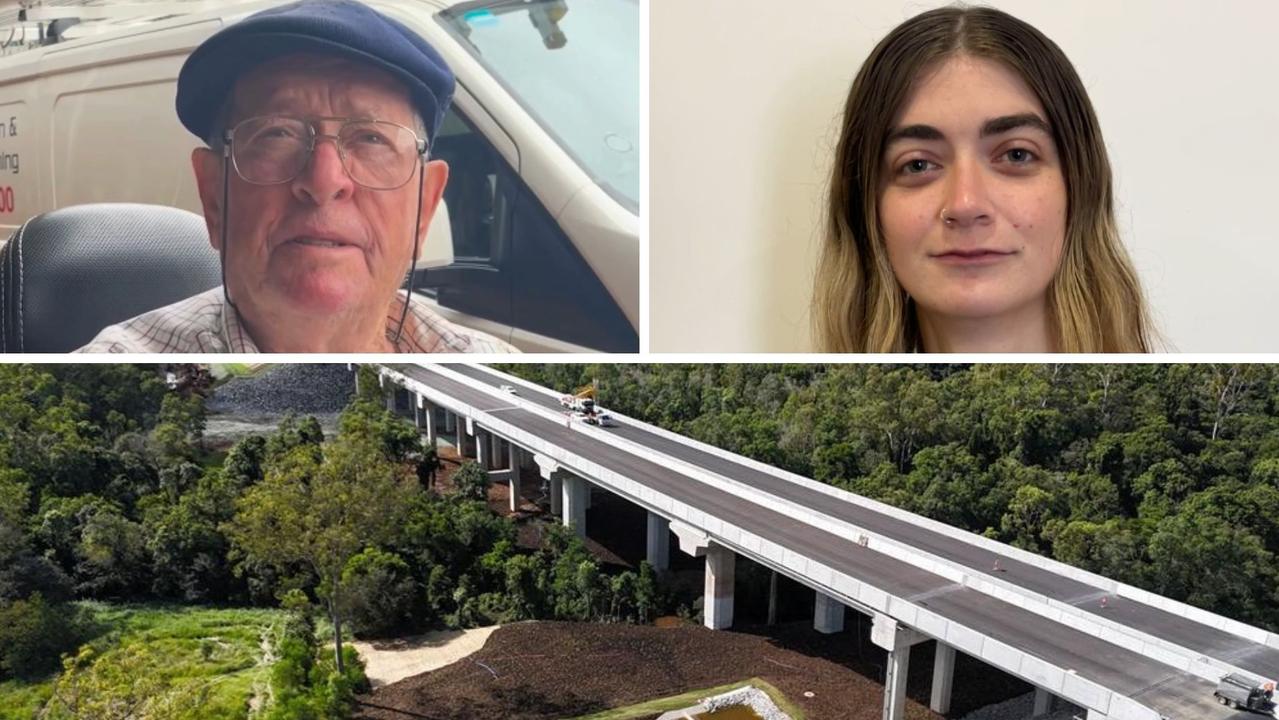The bravest and best pig hunters of Queensland
They are fearless, don’t mind flies and prickles, follow their trusty dogs to targets and know how to spot a croc. Love them or hate them, meet the men and women pig hunters of Queensland.
Community News
Don't miss out on the headlines from Community News. Followed categories will be added to My News.
The confronting profession and hobby of catching, trapping, hunting and dispatching of feral pigs is an unfortunate reality for farmers and local governments from regional to rural Queensland.
Feral pigs are smart, savvy, breed like rabbits, and leave trails of destruction behind them.
They can survive in various terrains, teach their young to avoid traps and poison bait, respond to sounds quickly, can be lethal, grow to an enormous size and adapt to their conditions quickly.
There is no easy solution for eradicating pigs, and every method, from shooting them from helicopters or using thermal drones, catching them with dogs bred specifically to hunt them, trapping them or laying out poison involves the uncomfortable subject of death.
“It’s not a sport, it’s life or death - for you and the pigs,” Australian Pig Doggers and Hunters Association president Ned Makim said.
Mr Makim has been working with other pig dog hunters for almost 20 years to set guidelines and regulations around the safety, biosecurity and humane animal treatment within the industry.
Pig dogs are bred and trained to be species specific, Mr Makim said.
He said the word ‘pig dog’ tends to draw uncomfortable pauses, and he has been advocating for more knowledge, training and education to improve safety for the dogs, pigs, native wildlife and hunters.
Pig hunting is legal in Queensland and hunters are expected to follow Queensland’s Animal Care and Welfare Act, but it’s not without controversy as the RSPCA is opposed to it.
The RSPCA states on their website, “hunting of pigs with dogs is inherently cruel and unnecessary” because of the “pain and suffering caused”.
Whether you find their methods brave and courageous or confronting and unsettling, they tell a necessary, but largely untold story of the Queensland landscape few people get the chance to experience. Meet 10 of the top pig hunters in Queensland.
Sam Floss
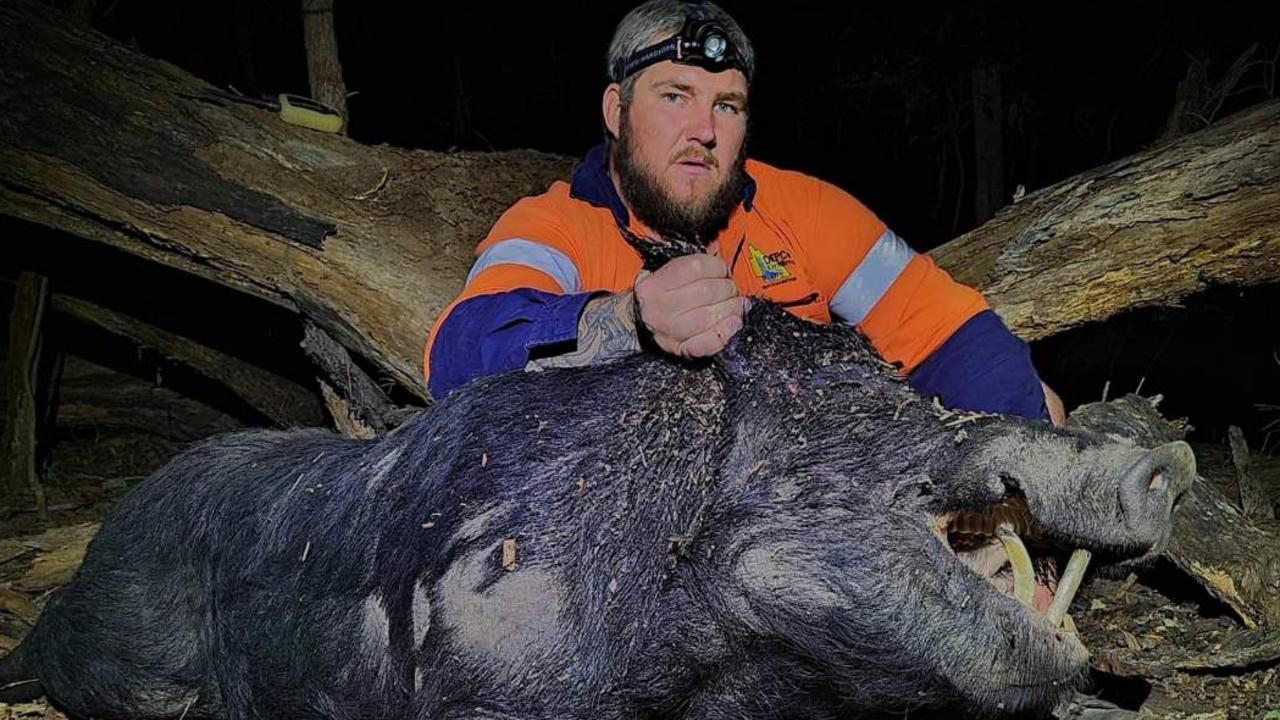
Sam Floss runs Cane Pig Queensland, a Torbanlea feral pest control service which traps and hunts feral pigs on Bundaberg cane farms.
In November, he was out hunting with his three-legged dog, Molly, when they chased a pig from the cane into a saltwater creek nearby.
Having to follow his dogs into the water, he swam out to the pig and tried to dispatch it with his knife, but the knife wasn’t there.
“So I tried to save the dog’s life by pulling them off the pig by pushing off the pig, like if you to push out from a backstroke in a swimming pool,” he said.
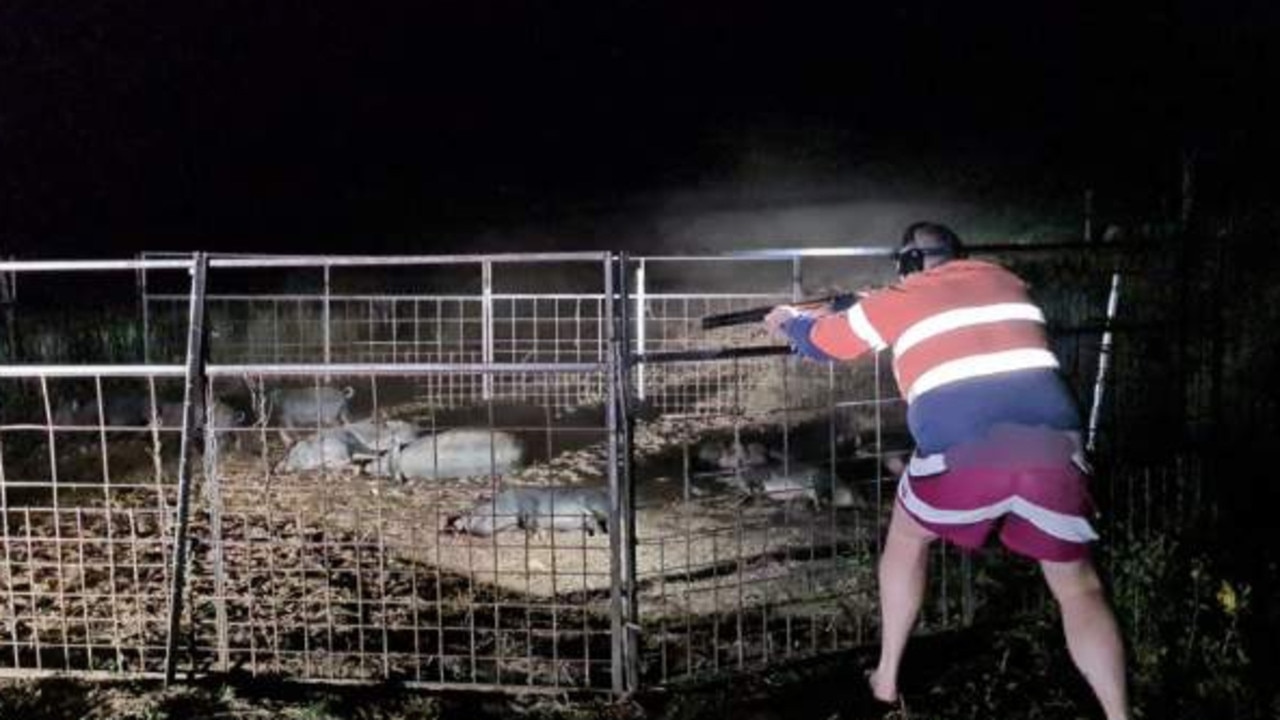
“As I was trying to get away, this pig swung around, hit me, nearly knocked me out, and started to push me in the water.”
He said he managed to get the dogs and himself off but in doing so, pushed on to the wrong side of the river.
“The scariest part for me was trying to convince myself to swim back across,” he said.
“I just didn’t know what was in the river, someone just down the road had caught a croc in there only a few weeks ago.”
Mr Floss said he gets a lot of hate for hunting with dogs, and he started his social media to teach people his hunting methods.
“Because many people don’t learn the right way to do it, the Act states it must be humane and ethical and precise, but people aren’t learning correctly,” he said.
Nat Folpp
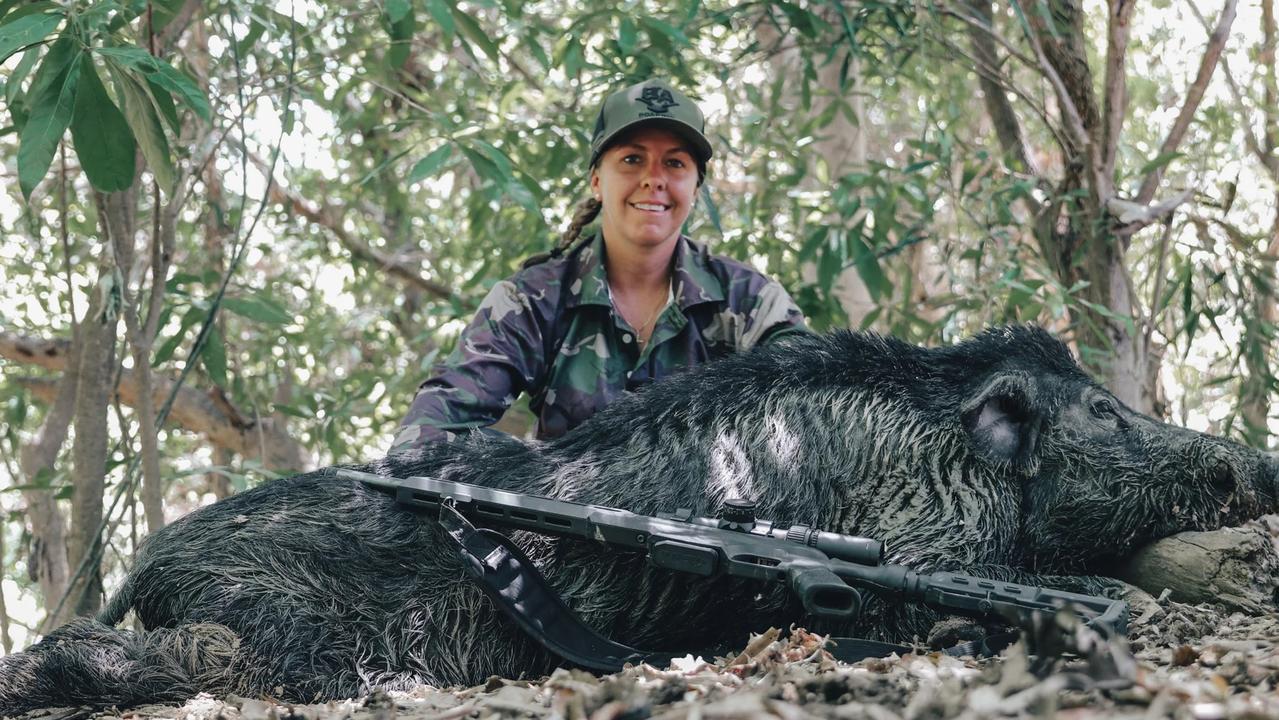
Nat Folpp is one part of Boaring Australia, a family of four from Clermont who share their journey of travelling Australia as full-time pig hunters with their 35,000 followers on YouTube.
Not only skilled with a rifle, trained dogs and a knife, Nat captures some incredible video footage from Australian landscapes along with the adventures of hunting and chasing pigs.
“We started videoing because we would see crazy things out in the bush and no one would believe us,” she said.
“It’s such uncharted and unexplored areas that we go hunting in.”
Often Mrs Folpp takes the dogs and goes hunting by herself, but is all too aware of the risks of the bush.
One of her scariest experiences was in the Northern Territory when her buggy hit a stump and the tyre came off.
“The dogs just went in all directions and I had to go out there, quickly kill that pig and walk back to the car,” she said.
“I had to walk 12km in the middle of the night by myself to get to the car.
“I had to walk with the rifle through the scrub in the middle of the night with bulls and wild pigs running and taken off right beside me in the grass.”
“Then the dogs had a big boar bailed up and I had to climb over the sticks to try and kill it.
“It was a full on couple of hours, that’s for sure.”
Dan Folpp
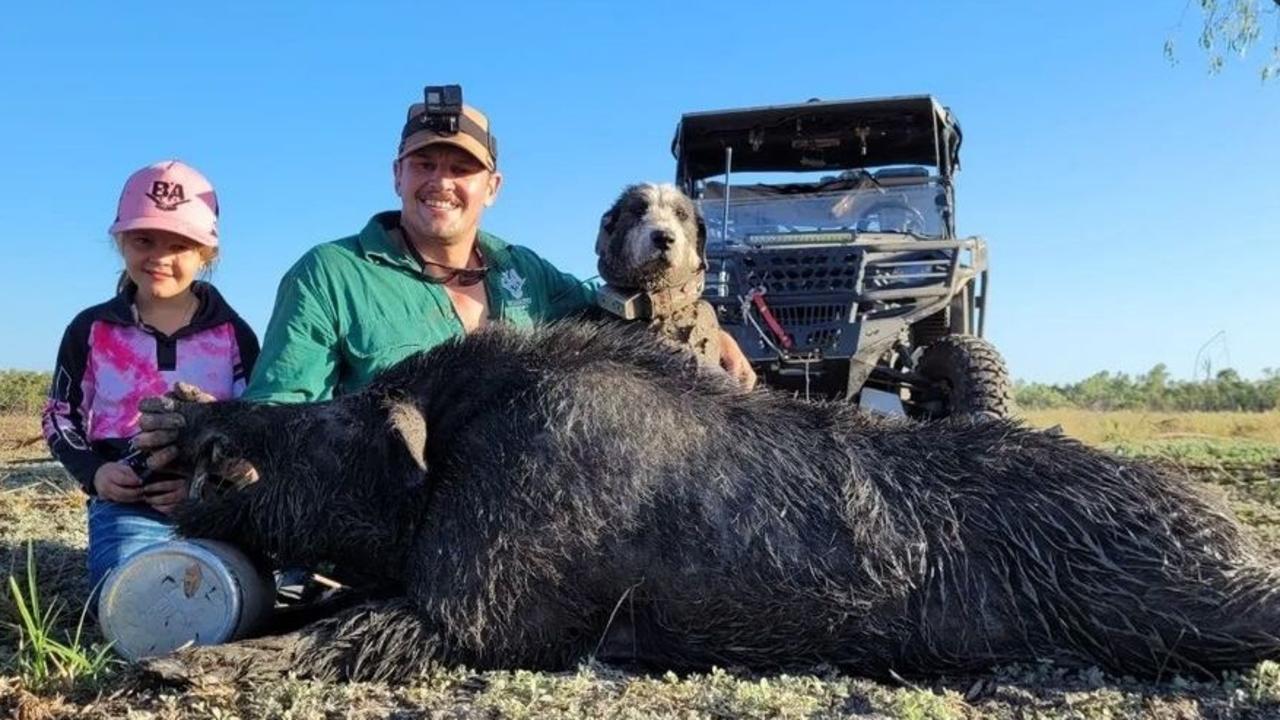
For Dan Folpp, the other half of Boaring Australia, hunting pigs is “basically all I have ever wanted to do since I was a young fella”.
It was when he was hospitalised for a week after a brush with an angry boar two years ago that Mr Folpp realised he wasn’t “bulletproof”.
“I used to just catch pigs by hand without the dogs, but this fella, he was way too angry and I sort of stepped in and missed,” he said.
Mr Folpp was then picked up by the pig’s tusks and flicked over a log.
In the last year Mr Folpp and his family have been working on a property along the Gulf of Carpentaria and has seen first-hand the destruction feral pigs cause.
“One of the issues on the coast is the turtles and nesting season, so we are doing our best to wipe out the pigs in that area, so hopefully there’ll be an increase in turtle numbers in the Gulf,” Mr Folpp said.
“Birds all come to nest in the big billabongs and swamps and the pigs just absolutely run amok, just trash the whole environment and wipe out the sites where the birds are going to nest and lay their eggs.”
As much as possible, the family takes their two kids hunting with them, wanting them to learn about the lessons of the bush and the realities of life and death it brings.
“It teaches them to have a lot more respect for animals, what they provide for us, and the consequences of killing.”
The largest boar Nat and Dan Folpp caught together was 151kg.
Beau Lynd
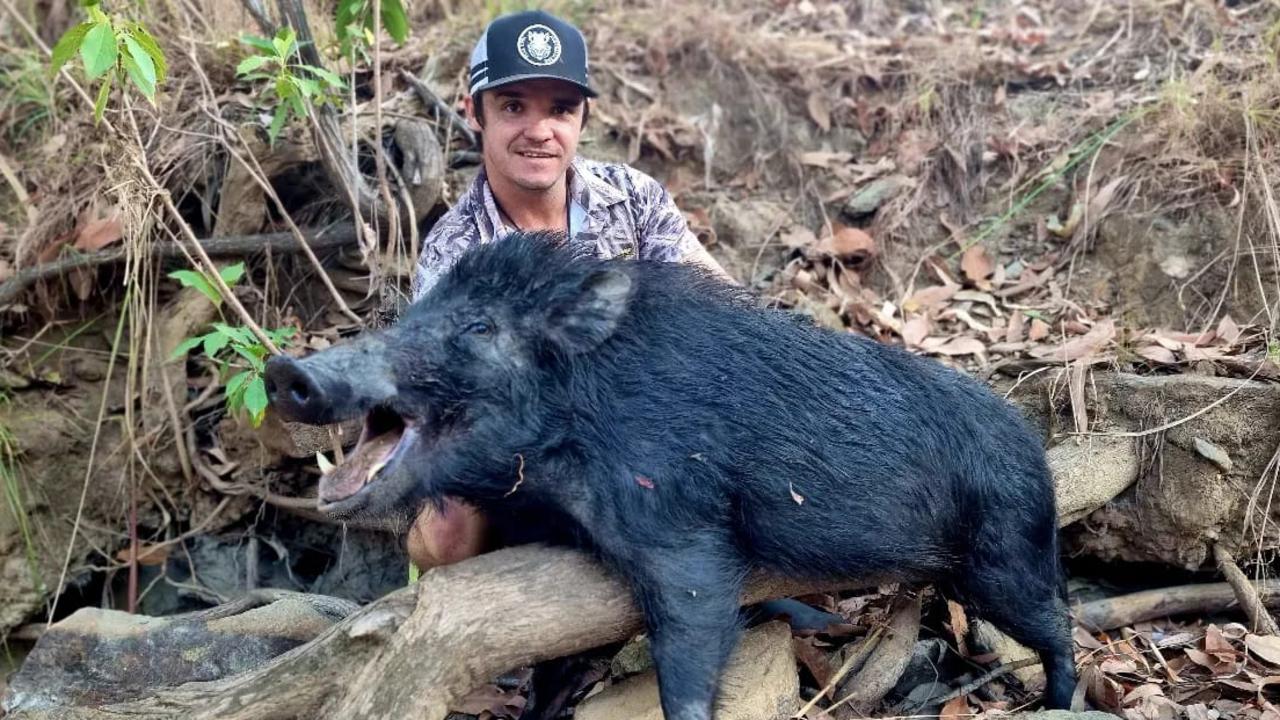
Hunter, fisherman, a mining machine operator, and a boathand, Beau Lynd is no stranger to the wilds of Cape York, and in his time tracking and hunting pigs, he has grown to respect their keen sense of survival, but has also witnessed first-hand how they can turn a conservation park into an uprooted mess.
“The hunters only got to be lucky once, but the pig’s got to be lucky every time,” he said.
He said the pigs around the Cape are used to be hunted and “wise up” to the use of firearms, traps, and poisons.
“You’ve got to know your paddocks pretty well with their escape routes.”
His moment of truth came when he was trying out a new knife in Lakeland and his dogs had bailed up a pig.
As he went to dispatch it, he misjudged the pig and it brushed past him.
Not realising the pig had torn through his leg, he tried to run after it but couldn’t move the injured leg.
“When I looked down it was just wide open and everything and I could see the bone,” he said.
Luckily a mate managed to get a clean shot at the pig before it could do more damage to the dogs or to Mr Lynd.
A bumpy three hour ride in the back of the ute with his leg stuffed with life-saving gauze, Mr Lynd made it to Mareeba Hospital, where he spent the next week having surgeries on his leg.
One of the biggest misconception people have of wild animals he said was that they “get old and die peacefully”.
“Whereas in reality it’s survival of the fittest.
“Wild animals die of starvation, or get mauled to death by another animal, or eaten, or drown, or breaks a leg and dies of thirst.
“There is not that peaceful, sort of picture of death that people try and paint.”
Darren Pratt
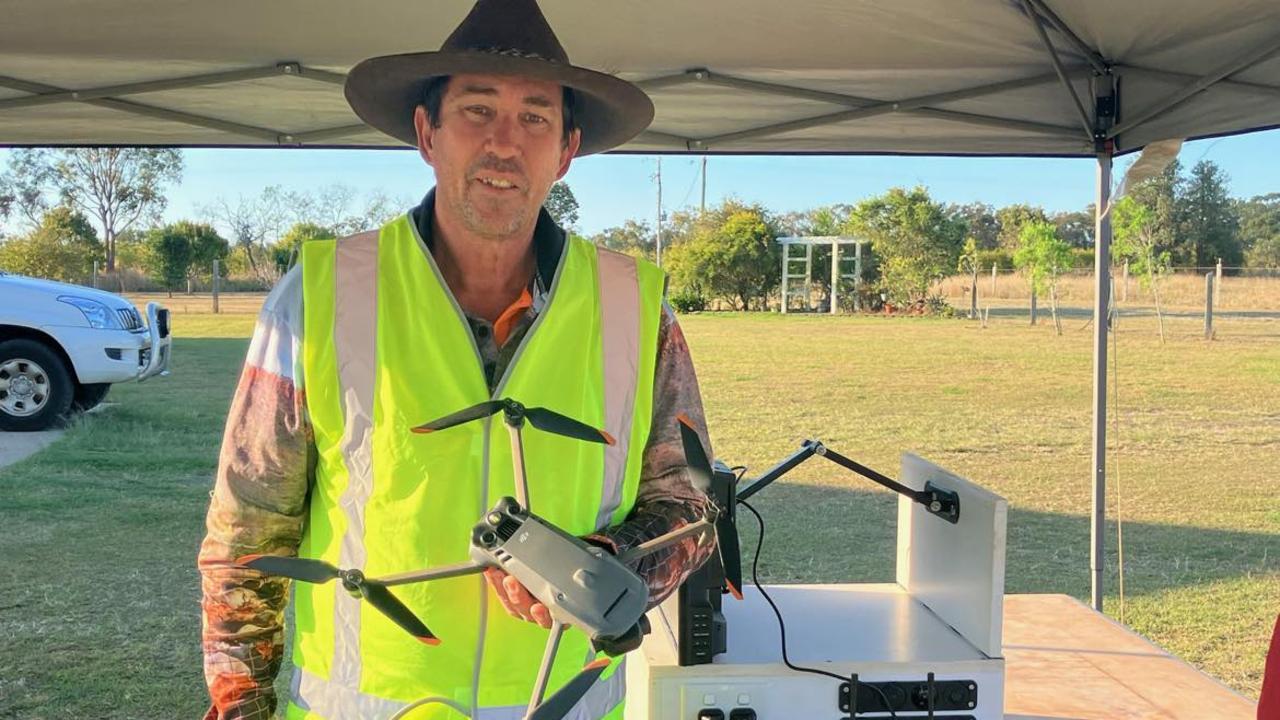
Darren Pratt works with a small team in Bundaberg Feral Pest Control as a professional feral pest controller to eradicate pigs and wild dogs around properties.
He said he traps or shoots around 90 pigs a month.
He works with a sophisticated set-up including a thermal drone that can sweep a 400ha property in 45 minutes to locate and track the pigs.
At night the drone works much better, rendering the trees and terrain almost invisible as it tracks the heat off animals.
With the dry and then wet weather conditions, Mr Pratt said he is seeing more and more pigs, wild dogs and dingoes around properties, especially in the Bundaberg region.
“I’ve never seen it like this before,” he said.
Steve Andrew
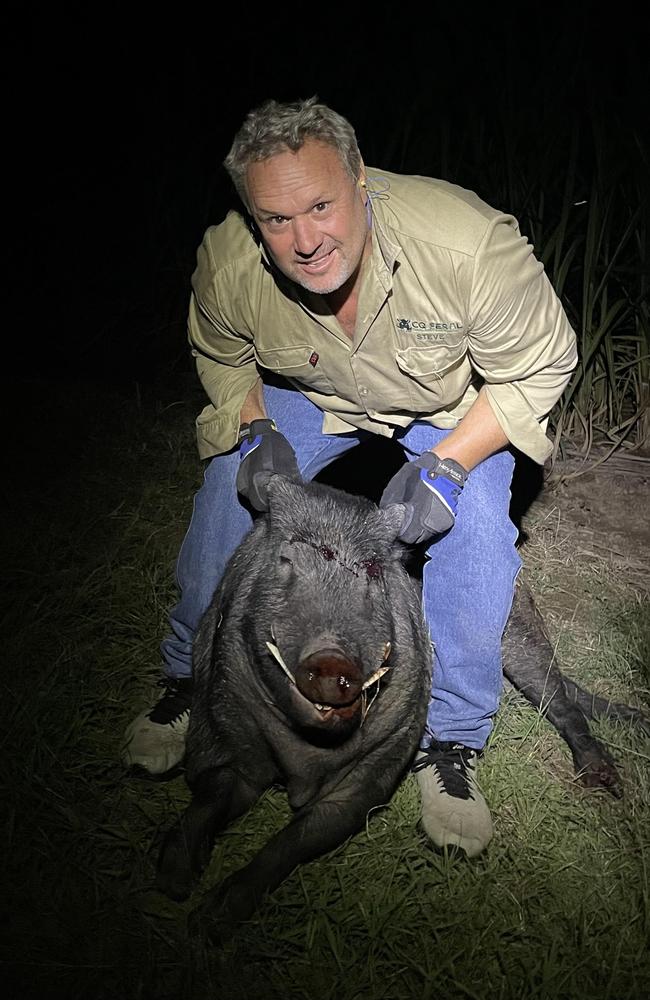
A politician by day and a pig hunter, or a ‘professional pest controller’, by night, Mirani, Queensland MP Steve Andrew said he learned how to track and hunt from his grandfather when he was just a boy.
Preferring the title of a professional pest controller, Mr Andrew said he shoots and trap pigs, rather than uses dogs to bail them up.
When he gets a chance he’ll go out onto properties and help eradicate pigs, he said in the last year there has been $106m worth of damage from pigs.
“And that is of known damages.”
He said was only just up in North Eden tracking pigs along a flood plain and he saw the “acres and acres” of damage in wild country with mangroves and 4.5m drops making it is almost impossible to hunt the pigs aerially.
“Pigs are extremely smart, they use a whole system to travel and breed from one farm to the next.”
One night in early December he was walking back to his daughter who was waiting in the car on a North Eden property after checking on a trap, and as he turned a corner a 124kg pig came out of the cane directly in his path and started charging at him.
“He was right there, and he was came right at me, luckily I had the rifle with me and my thermal sight,” Mr Andrew said.
“I shot him right between the eyes and killed him right there and he slipped, stopping about five or six metres away from me.”
Mr Andrew has been working on a designing a pig trap that can trap numbers at a time, rather than relying on hunting and catching one at a time.
In the last year Mr Andrew said he has caught more than 200 pigs.
“If you’ve got 100 pigs, you got to kill 75 a year just to keep the number at 100,” he said.
Frog Danaher

Located up north in thick rainforests near Cooktown, Frog Danaher has been hunting pigs for almost 30 years and runs a side business called FrogDogs Australia.
While Mr Danaher has been chased up trees by feral pigs, it is not the pigs he fears, it is other predators of the Australian wild.
One of the scariest experience he had was when he was out hunting with his family and chased a pig into a crystal clear rainforest stream, his dog followed, and out of nowhere a four-metre saltwater croc jumped out and took his beloved dog.
“We were in a bit of a shock, because it was just one of them places where you didn’t think crocs would be or you thought you would see them in the crystal clear water,” he said.
“It was a bit of learning curve for my children not to get too close to the water.”
Mr Danaher often hunts with his two girls and his wife, Denicka, also an avid pig hunter.
“My kids learn so much just coming out in the bush, it is not just all about catching and killing pigs,” he said.
“They learn that we don’t sit there and torment the pigs, we are there to control the pig numbers to help the environment.
“They learn a lot about life and death and they did learn a lot about just how dangerous crocodiles can be, unfortunately, through our poor beloved dog.”
The biggest pig Mr Danaher caught was a 150kg boar in Georgetown in 2003.
Denicka Danaher
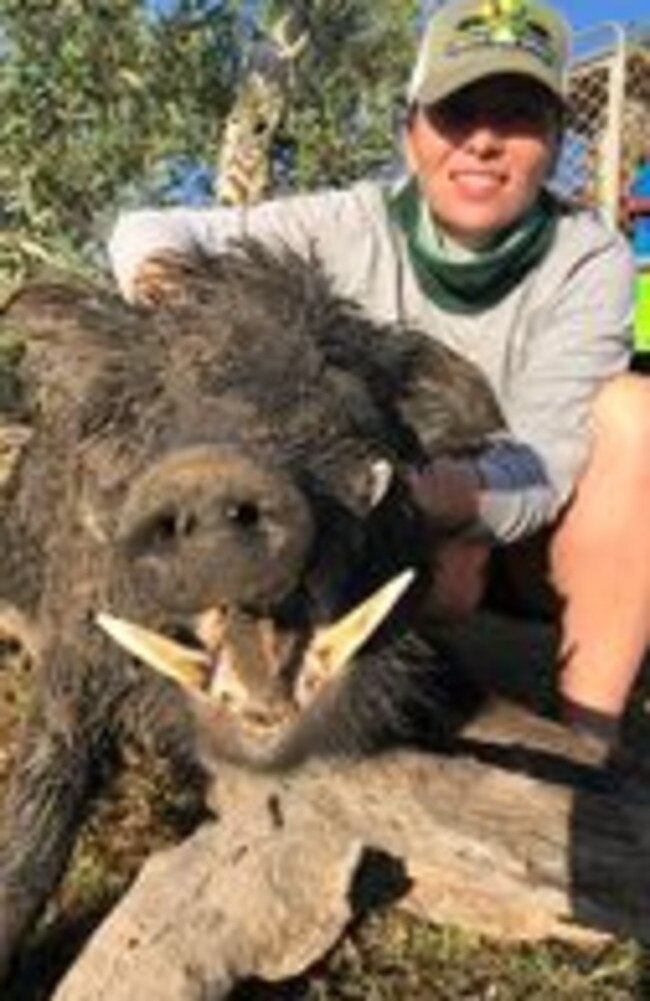
Denicka Danaher is an integral part of the pig hunting culture and community of Cooktown and often hunts alongside her husband Frog Danaher and their children.
She is passionate about eradicating pigs, seeing the impact they have on the native wildlife along the coast of the reef, particularly on turtles.
In September she organised the Cooktown Hotel Hog Hunt, which resulted in more than 9000kg of feral pig pass over the scales of the competition.
Josh Wilcox
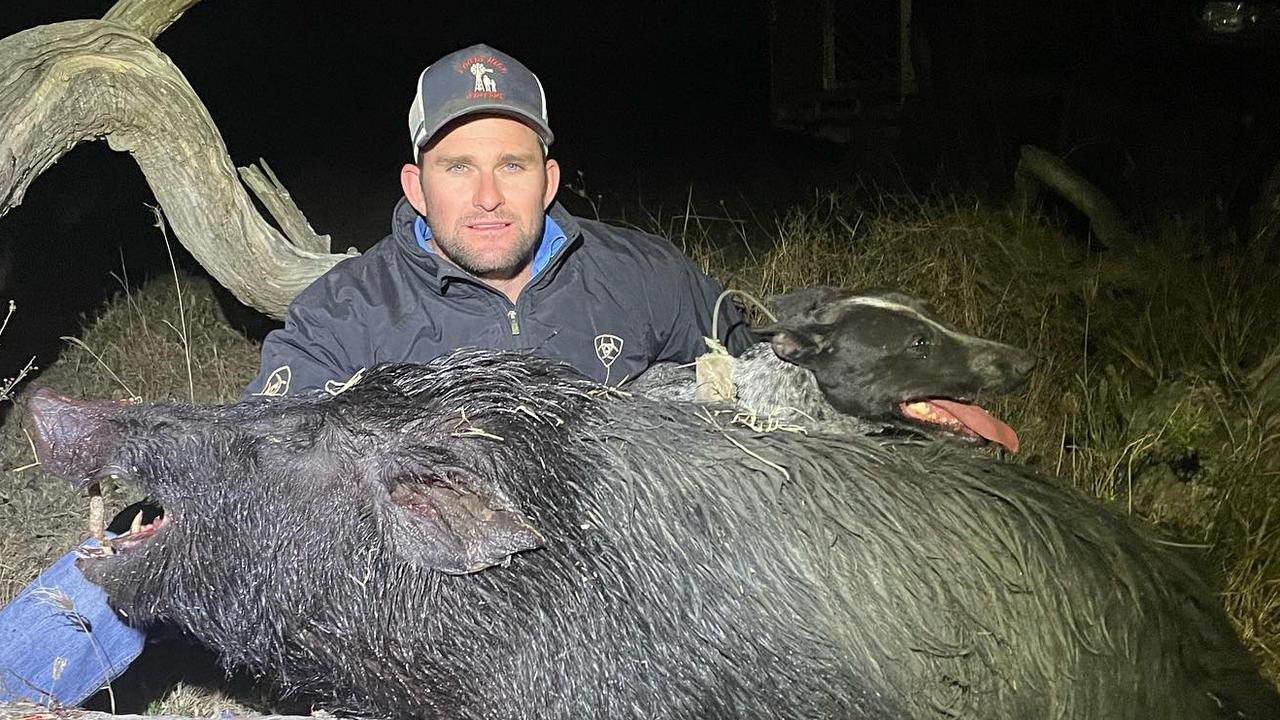
Josh Wilcox shares his hunting adventures with over 30,000 followers on his Instagram account, Hunting Dogs Australia.
In an interview with Bailing, Scaling and BBQ he said he comes from a generations of hunters who made a living off hunting, and he learned alongside his father and grandfather since he was a little boy growing up in Orange, NSW.
He now lives in Townsville and is a FIFO worker, on his time off he said he is usually out hunting.
When he gets a chance he is often found answering questions on social media and offering expertise over how best to look after hunting dogs.
Stu Biggs
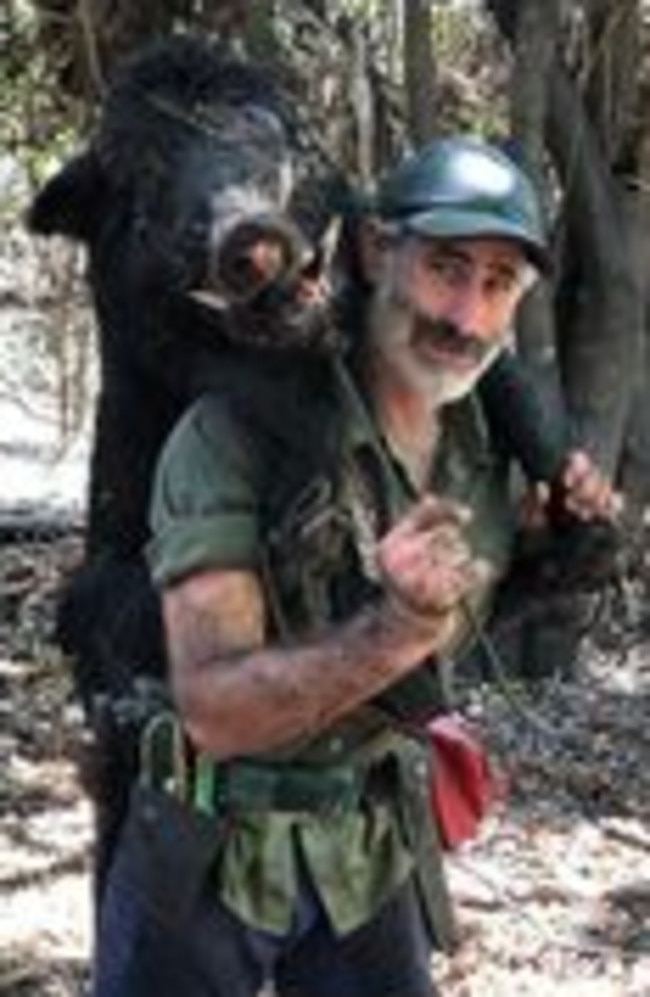
With a degree in ecology and zoology, and a certified dog handler, Stu Biggs has worked as a professional hunter for the New Zealand parks and wildlife service, travelled the world, went to university, and ran his own business.
But in the past couple of years, he has found himself some loyal and trusting dogs which have settled him down in the Cape York area, where he spends most of his time hunting with them, and this year has caught more than 200 pigs.
He’s been chased by pigs up trees many times, the closest call he had was in the Northern Territory, when a boar charged at him and knocked him over - it was his dog that saved him.
In awe of a dog’s ability and senses, Mr Biggs said dogs are one of the reasons he loves hunting.
“Nothing thrills me more than watching the dogs do what they’ve evolved to do and bred to do,” he said.
“They are superb creatures.
“Watching them use their senses, they’re so far beyond anything we possess.
“It is as a sight to behold, watching a dog stick its nose up in the air and then run over a kilometre and a half in the thick jungle through gullies to find a pig - it is quite an amazing thing.”
A common misconception many people have over pig hunting is the dogs are “slavery, bloodthirsty killing machines that are completely out of control”, he said.
“Another is that pig hunters are the same.”
He admitted there are always some “bad apples”, but in his experience the dogs are treated well and some of the “calmest, most well behaved, happiest dogs you’ll ever see”.
“I think that we’ve played a bit of a cruel trick on these species, we’ve bred and selected them to have high hunting drive.
“But then some of these dogs end up in shelters, or are bought as pets for people and they just stick them in their backyard and don’t do anything with them.
“You know, then these poor things get mad and they exhibit all kinds of behaviours, which suddenly become problems.”
More Coverage
Originally published as The bravest and best pig hunters of Queensland







